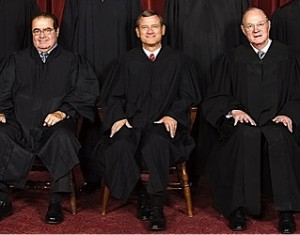
The three key right-wing justices on the U.S. Supreme Court, from left to right, Antonin Scalia, John Roberts and Anthony Kennedy. (From the official 2010 photo of the U.S. Supreme Court)
If white rule in the United States is to be restored and sustained, then an important first step will be the decision of the five Neo-Confederate justices on the U.S. Supreme Court to gut the Voting Rights Act, a move that many court analysts now consider likely.
The Court's striking down Section Five of the Voting Rights Act will mean that jurisdictions with a history of racial discrimination in voting -- mostly in the Old Confederacy -- will be free to impose new obstacles to voting by African-Americans, Hispanics and other minorities without first having to submit the changes to a federal court.
Already, the Republicans' aggressive gerrymandering of congressional districts has ensured a continued GOP majority in the U.S. House of Representatives although Democrats out-polled Republicans nationwide in Election 2012.
Some GOP-controlled states, which also have tended to vote Democratic in presidential elections, are now considering apportioning presidential electors according to these gerrymandered districts to give Republican presidential candidates most of the electoral votes even if they lose the state. [See Consortiumnews.com's "Return of Three-Fifths of a Person."]
On Wednesday, the five partisan Republicans on the U.S. Supreme Court showed that they wanted to do their part in devaluing the votes of blacks, Hispanics, Asian-Americans and young urban whites. So the key GOP justices indicated during oral arguments that they are looking for excuses to strike down the heart of the Voting Rights Act.
Right-wing Justice Antonin Scalia shocked the courtroom when he dismissed the Voting Rights Act as a "perpetuation of racial entitlement," suggesting that the right of blacks to vote was some kind of government handout.
But almost as troubling was the remark from Justice Anthony Kennedy who insisted that the Voting Rights Act, which was first enacted by Congress in 1965 and was renewed overwhelmingly in 2006, was an intrusion on Alabama as an "independent sovereign," states' rights language reminiscent of the Old Confederacy.
Indeed, the five Republican justices -- also including John Roberts, Clarence Thomas and Samuel Alito -- seem to have absorbed a Neo-Confederate interpretation of the Constitution that is at odds with what the Framers intended.
The Stolen Narrative
The language about "independent" and "sovereign" states was part of the Articles of Confederation, which governed the United States from 1777 to 1787 and which proved so disastrous that George Washington and James Madison insisted that the Articles be tossed out entirely during the writing of the Constitution in 1787.
General Washington, in particular, hated the concept of "independent" and "sovereign" states because he saw the effect on his inability to secure adequate supplies and munitions for his troops during the Revolutionary War. The states often reneged on their promises to provide support, and the central government had little power. In the Articles, it was deemed a "league of friendship."
With the Articles failing as a governing structure, the Constitutional Convention in Philadelphia was instructed to propose amendments, but Washington and Madison engineered the complete elimination of the Articles in favor of the new Constitution.
The Constitution made federal law supreme and transferred national sovereignty from the 13 states to "We the People." All language about state "sovereignty" and "independence" was expunged, though the Framers left the states substantial control over local matters.
However, the tensions between the federal government and the states continued, especially over the South's insistence that the slavery of African-Americans be made a permanent part of American life. Among the compromises in Philadelphia had been a particularly offensive clause that counted black slaves as "three-fifths of a person" for the purpose of representation.
Slave states also wanted their "peculiar institution" to be extended to other incoming states to prevent the possibility of non-slave states outvoting the slave states in Congress. Ultimately, this dispute led to Southern states seceding from the Union after Abraham Lincoln's election in 1860.
The Rise of Jim Crow
(Note: You can view every article as one long page if you sign up as an Advocate Member, or higher).





